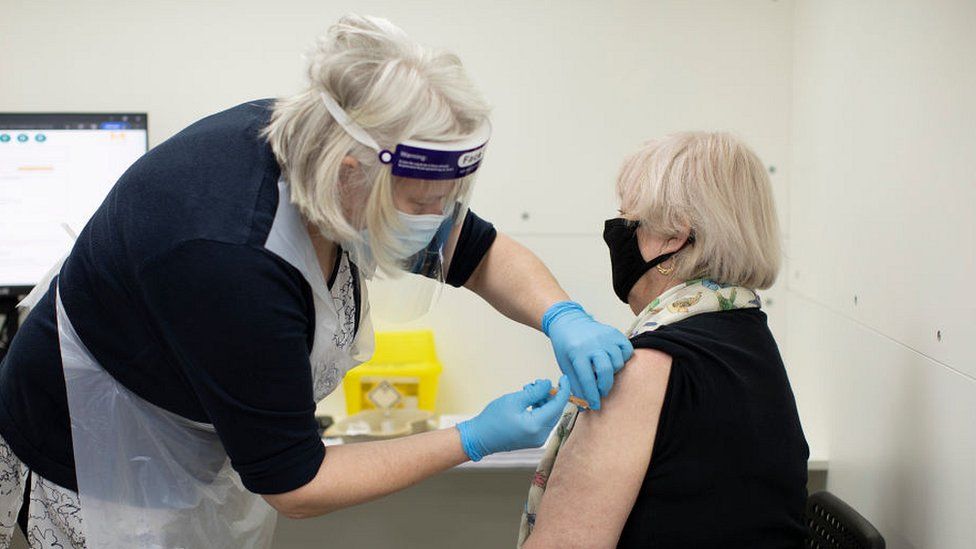Updated coronavirus vaccines can be fast-tracked like flu jabs
- Published
- comments

New Covid vaccines to fight variants like the one from Brazil can be fast-tracked through the approval system, says the UK's regulator the MHRA.
Current vaccines may not work as well against some variants and scientists are working on updating them now.
But manufacturers will not need to seek brand new approval or do lengthy clinical studies.
However they will need proof that the shots trigger protective antibodies in the blood.
The aim is to shorten the process, where possible, so that vaccine approval could happen in weeks and months, not years.
A similar fast-track method is already used for annual flu vaccines which regularly need updating to keep up with a virus that is constantly changing by mutating.
The MHRA has issued guidance, along with authorities in Australia, Canada, Singapore and Switzerland, on what checks and measures would be necessary.
The coalition of regulators - the ACCESS Consortium - insist no corners will be cut, with safety paramount.
Data from existing coronavirus vaccine trials and ongoing studies on real world use in the millions of people currently getting immunised could be used to support any decision by regulators.
Existing Covid vaccines already in use - such as the Oxford-AstraZeneca vaccine and the Pfizer-BioNTech one - were developed at incredible speed. The process took around 10 months, instead of a decade in normal times.
Making small and relatively simple tweaks to these vaccines to make them a better match for new variants should happen even more quickly.
Current vaccines were designed around earlier versions of coronavirus, but scientists believe they should still offer some protection against the new variants being seen now.
In the UK, public health officials are investigating six cases of the Covid variant first identified in Brazil and are using testing to see if it has spread to more people.
Surge testing for the South African variant of Covid-19 began on 1 February.
The UK government has already announced a deal with biopharmaceutical company CureVac to develop vaccines against future variants, with a pre-order of 50 million doses.
MHRA chief executive Dr June Raine said: "We don't have evidence at this moment that any of the vaccines in deployment are significantly lacking in effectiveness.
"They're effective against Kent and we believe South Africa.
"We know that there has been some data from South Africa, we believe effectiveness here is maintained, and we're working hard on the Brazil variant.
"As of today there's no imperative that we fast-track a new variant-effective vaccine - but we are prepared."
MHRA Chief Scientific Officer Dr Christian Schneider said: "Our priority is to get effective vaccines to the public in as short a time as possible, without compromising on safety. Should any modifications to authorised Covid-19 vaccines be necessary, this regulatory approach should help to do just that."
He said the public could be confident that no vaccine would be approved unless the expected high standards of safety, quality and effectiveness were met.
- LOOK-UP TOOL: How many cases in your area?
- LOCKDOWN RULES: What are they and when will they end?
- YOUR QUESTIONS: We answer your queries
- GLOBAL SPREAD: How many worldwide cases are there?
- TREATMENTS: What progress are we making to help people?
- Published1 March 2021